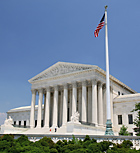
The U.S. Supreme Court on Monday ruled that private-sector companies may force employees to individually arbitrate alleged violations of federal labor law, rather than allowing them to seek class-action remedies as a group.
Taken in aggregate with arbitration-friendly decisions from 2017, the decision further lowers the threat of huge, damaging courtroom decisions against long-term care providers.
The 5-4 vote is considered a blow to workers, including those at Epic Systems Corp., who brought one of three related cases being decided by the Court.
In the majority opinion, Justice Neil Gorsuch wrote that the 1925 Federal Arbitration Act trumps the National Labor Relations Act. The ruling means employees who sign employment agreements to arbitrate claims must do so and cannot try to remedy wage or hours violations in the courts first.
In her dissent, Justice Ruth Bader Ginsburg called the majority opinion “egregiously wrong.” She argued that the newer federal labor laws should preempt “arm-twisted,” “take-it-or-leave it” provisions that many employers insist upon as a term of employment. She warned of under-enforcement of federal and state statutes designed to advance employees’ safety and well-being.
The ruling came in three cases — potentially involving tens of thousands of nonunion employees — brought against software developer Epic Systems Corp., Ernst & Young LLP and Murphy Oil USA Inc.
Each required its individual employees, as a condition of employment, to waive their rights to join a class-action suit.
In 2016, a three-judge panel for the United States Court of Appeals for the Seventh Circuit ruled that Epic, the Wisconsin-based healthcare giant whose EHRs cover more than 50% of Americans’ health data, couldn’t require the clause.
An employee had sued Epic after it denied him and others overtime wages. In all three cases, employees argued that the cost of bringing such cases individually would be swallowed up by legal fees.
Monday afternoon, the National Labor Relations Board said it had 55 related pending cases, and many others previously decided by the board are in the federal appeals system.



